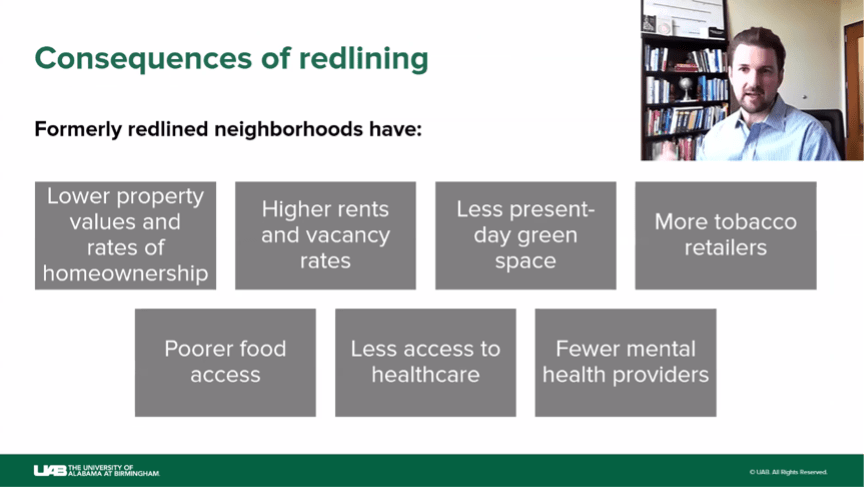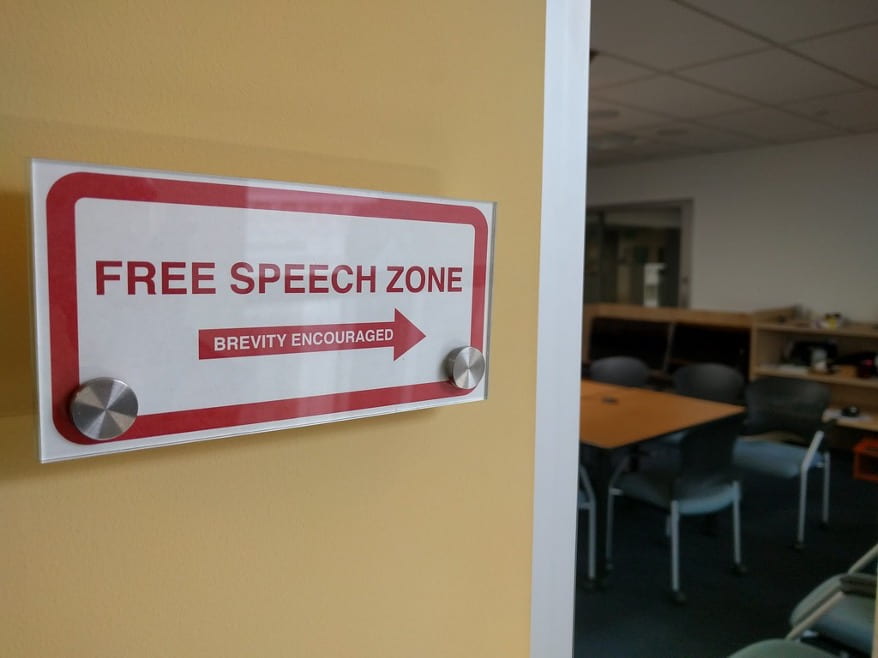Written by Brian C. Moon – Center for Clinical and Translational Science
On March 7, 2024, an enlightening virtual event titled “Historic Lines, Current Divides: Connecting Redlining to Present Day Disparities in Birmingham” was hosted via Zoom, shining a spotlight on the enduring impacts of redlining practices in Birmingham and their ripple effects on present-day disparities. The forum was an initiative co-hosted by the Social Science and Justice Research (SSJR) pilot UWIRC and the Center for Clinical and Translational Science (CCTS), uniting a multidisciplinary audience to explore the intersection of historic housing policies and current social and health inequities.
The event commenced with Dr. Tina Kempin Reuter, Professor and SSJR Director, providing a comprehensive overview of the event, emphasizing the program’s commitment to addressing issues of access, inclusion, equity, justice, and human rights through cutting-edge research. This set the stage for a deeply engaging discourse on Birmingham’s redlining history and its ongoing consequences.
The first presenter, Dr. Lonnie Hannon, Associate Professor and Deputy Director of the Lister Hill Center for Health Policy, offered a profound analysis of Birmingham’s segregation practices, including redlining, and their foundational role in shaping the city’s residential patterns and community empowerment dynamics. His presentation underscored the systematic denial of services to black communities and the generational impacts of these discriminatory practices.
Dr. Peter A. Jones, Associate Professor and SSJR Associate Director, expanded the discussion to the realm of public policy, tracing how redlining influenced urban planning and public policy decisions. His insights into the role of redlining in the design of interstate systems in Birmingham illuminated the depth of its influence on community development and segregation.
Next up, Assistant Professor of Medicine in the Division of Hematology & Oncology, Dr. S. M. Qasim Hussaini delved into the tangible health disparities emerging from redlined neighborhoods, particularly in cancer care. His research highlighted significant disparities in diagnosis stages, treatment, and survival rates for colon cancer patients from historically marginalized communities, stressing the need for equitable healthcare solutions. (Read more about Dr. Hussaini’s research here.)
The forum culminated with Assistant Professor of Medicine and CCTS Senior Administrative Director, Dr. Jennifer Croker, who echoed the sentiments of previous speakers, emphasizing the vital role of transdisciplinary teamwork in overcoming the various issues highlighted throughout the event. Croker praised the groundbreaking work of researchers like Dr. Hussaini, whose research offers valuable insights for healthcare improvement and policy formulation and underscored the CCTS’s commitment, in collaboration with SSJR, UAB Geospatial Research and Information Domain (GRID), and the Social Determinants Core, to making geospatial data more accessible for research endeavors. To this end, the CCTS has extended time-limited support to boost access to GRID by researchers with nascent knowledge of geospatially informed data resources to get their projects underway—email Ariann Nassel for more information. By lowering technical and financial barriers, the CCTS aims to foster innovative projects that address educational, social, and health disparities. Croker’s call to action encouraged participants to transform their ideas into impactful research, marking a proactive step towards addressing the complex challenges discussed during the forum.
For those who could not attend or wish to revisit the discussion, this session was recorded and is available for viewing on the CCTS Video Channel.








